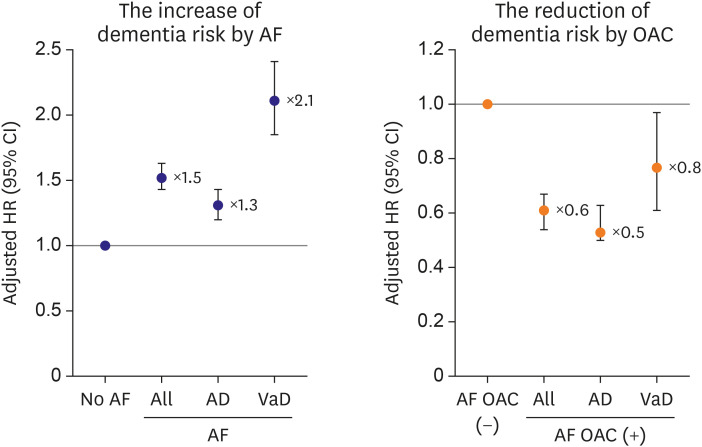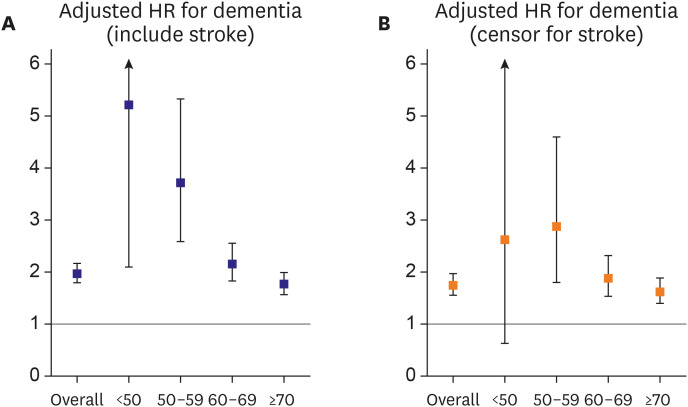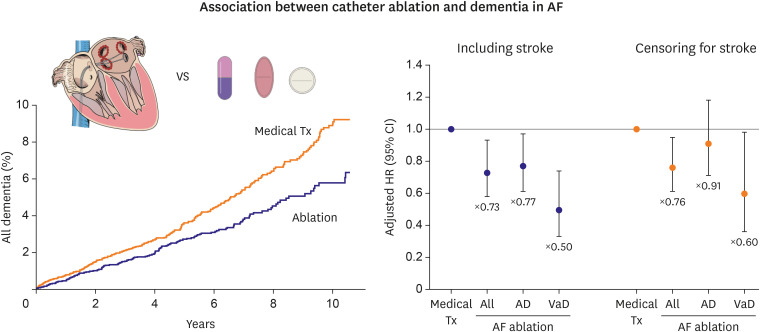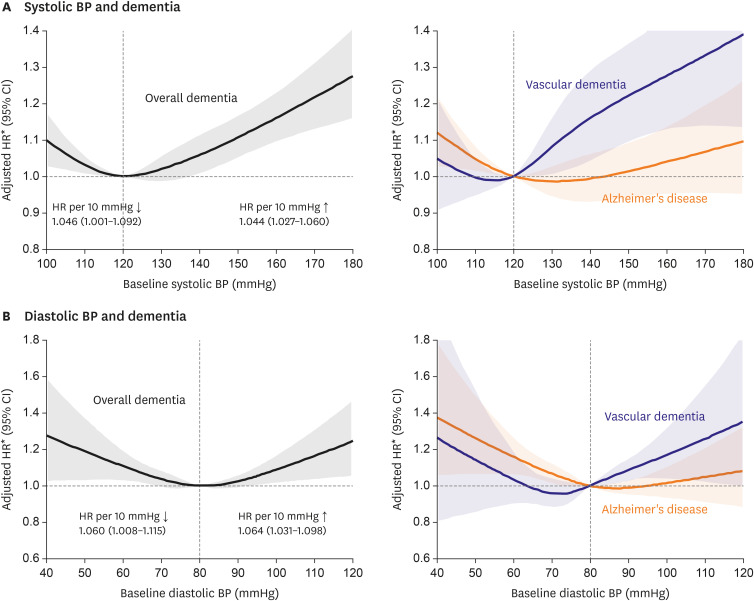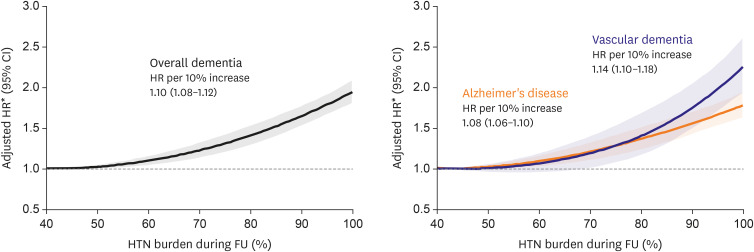Korean Circ J.
2021 Apr;51(4):308-319. 10.4070/kcj.2021.0027.
Prevention of Dementia in Patients with Atrial Fibrillation
- Affiliations
-
- 1Division of Cardiology, Department of Internal Medicine, Severance Cardiovascular Hospital, Yonsei University College of Medicine, Seoul, Korea
- 2Department of Cardiology, CHA Bundang Medical Center, CHA University, Seongnam, Korea
- KMID: 2514634
- DOI: http://doi.org/10.4070/kcj.2021.0027
Abstract
- Atrial fibrillation (AF) is the most common form of arrhythmia in the elderly population and increases stroke risk by a factor of 4- to 5-fold. There is increasing evidence to suggest that incident AF may contribute to the development of dementia, independent of overt stroke. In particular, relatively younger patients with AF are more prone to dementia development than older patients with AF. Evidence is accumulating regarding the possible treatment strategies for preventing dementia in patients with AF. Oral anticoagulation may be effective for reducing the risk of dementia, even in patients with low stroke risks. Among oral anticoagulants, the use of non-vitamin K antagonists have been associated with a considerably decreased risk of dementia than warfarin. Moreover, successful catheter ablation for AF has also been associated with decreased dementia risk compared to medical therapy, suggesting that restoration of sinus rhythm, and not the ablation procedure itself, as the important mechanism in the prevention of AF-associated dementia. Among midlife patients with AF, there appeared to be a U-shaped association of blood pressure (BP) and a linear association of hypertension with dementia risk. A BP of 120 to 129/80 to 84 mmHg has been identified as the optimal range. Finally, integrated management of AF was associated with a reduced risk of dementia in AF patients.
Figure
Cited by 1 articles
-
Optimal Rhythm Control Strategy in Patients With Atrial Fibrillation
Daehoon Kim, Pil-Sung Yang, Boyoung Joung
Korean Circ J. 2022;52(7):496-512. doi: 10.4070/kcj.2022.0078.
Reference
-
1. Lee H, Kim TH, Baek YS, et al. The trends of atrial fibrillation-related hospital visit and cost, treatment pattern and mortality in Korea: 10-year nationwide sample cohort data. Korean Circ J. 2017; 47:56–64. PMID: 28154592.2. Kim D, Yang PS, Jang E, et al. 10-year nationwide trends of the incidence, prevalence, and adverse outcomes of non-valvular atrial fibrillation nationwide health insurance data covering the entire Korean population. Am Heart J. 2018; 202:20–26. PMID: 29802976.3. Kim D, Yang PS, Jang E, et al. Increasing trends in hospital care burden of atrial fibrillation in Korea, 2006 through 2015. Heart. 2018; 104:2010–2017. PMID: 29666179.4. Wortmann M. Dementia: a global health priority - highlights from an ADI and World Health Organization report. Alzheimers Res Ther. 2012; 4:40. PMID: 22995353.5. Ott A, Breteler MM, de Bruyne MC, van Harskamp F, Grobbee DE, Hofman A. Atrial fibrillation and dementia in a population-based study. The Rotterdam study. Stroke. 1997; 28:316–321. PMID: 9040682.6. Bunch TJ, Weiss JP, Crandall BG, et al. Atrial fibrillation is independently associated with senile, vascular, and Alzheimer's dementia. Heart Rhythm. 2010; 7:433–437. PMID: 20122875.7. Dublin S, Anderson ML, Haneuse SJ, et al. Atrial fibrillation and risk of dementia: a prospective cohort study. J Am Geriatr Soc. 2011; 59:1369–1375. PMID: 21806558.8. Singh-Manoux A, Fayosse A, Sabia S, et al. Atrial fibrillation as a risk factor for cognitive decline and dementia. Eur Heart J. 2017; 38:2612–2618. PMID: 28460139.9. Marengoni A, Qiu C, Winblad B, Fratiglioni L. Atrial fibrillation, stroke and dementia in the very old: a population-based study. Neurobiol Aging. 2011; 32:1336–1337. PMID: 19732992.10. Rastas S, Verkkoniemi A, Polvikoski T, et al. Atrial fibrillation, stroke, and cognition: a longitudinal population-based study of people aged 85 and older. Stroke. 2007; 38:1454–1460. PMID: 17395865.11. Kim D, Yang PS, Yu HT, et al. Risk of dementia in stroke-free patients diagnosed with atrial fibrillation: data from a population-based cohort. Eur Heart J. 2019; 40:2313–2323. PMID: 31212315.12. Kim D, Yang PS, Lip GY, Joung B. Atrial fibrillation increases the risk of early-onset dementia in the general population: data from a population-based cohort. J Clin Med. 2020; 9:3665.13. Chopard R, Piazza G, Gale SA, et al. Dementia and atrial fibrillation: pathophysiological mechanisms and therapeutic implications. Am J Med. 2018; 131:1408–1417. PMID: 30076825.14. Friberg L, Rosenqvist M. Less dementia with oral anticoagulation in atrial fibrillation. Eur Heart J. 2018; 39:453–460. PMID: 29077849.15. Friberg L, Andersson T, Rosenqvist M. Less dementia and stroke in low-risk patients with atrial fibrillation taking oral anticoagulation. Eur Heart J. 2019; 40:2327–2335. PMID: 31095295.16. Jacobs V, Woller SC, Stevens S, et al. Time outside of therapeutic range in atrial fibrillation patients is associated with long-term risk of dementia. Heart Rhythm. 2014; 11:2206–2213. PMID: 25111326.17. Madhavan M, Hu TY, Gersh BJ, et al. Efficacy of warfarin anticoagulation and incident dementia in a community-based cohort of atrial fibrillation. Mayo Clin Proc. 2018; 93:145–154. PMID: 29329798.18. van Norden AG, van den Berg HA, de Laat KF, Gons RA, van Dijk EJ, de Leeuw FE. Frontal and temporal microbleeds are related to cognitive function: the Radboud University Nijmegen Diffusion Tensor and Magnetic Resonance Cohort (RUN DMC) Study. Stroke. 2011; 42:3382–3386. PMID: 21940975.19. Ruff CT, Giugliano RP, Braunwald E, et al. Comparison of the efficacy and safety of new oral anticoagulants with warfarin in patients with atrial fibrillation: a meta-analysis of randomised trials. Lancet. 2014; 383:955–962. PMID: 24315724.20. Wang KL, Lip GY, Lin SJ, Chiang CE. Non-vitamin K antagonist oral anticoagulants for stroke prevention in Asian patients with nonvalvular atrial fibrillation: meta-analysis. Stroke. 2015; 46:2555–2561. PMID: 26304863.21. Chen N, Lutsey PL, MacLehose RF, et al. Association of oral anticoagulant type with risk of dementia among patients with nonvalvular atrial fibrillation. J Am Heart Assoc. 2018; 7:e009561. PMID: 30571385.22. Jacobs V, May HT, Bair TL, et al. Long-term population-based cerebral ischemic event and cognitive outcomes of direct oral anticoagulants compared with warfarin among long-term anticoagulated patients for atrial fibrillation. Am J Cardiol. 2016; 118:210–214. PMID: 27236255.23. Søgaard M, Skjøth F, Jensen M, et al. Nonvitamin K antagonist oral anticoagulants versus warfarin in atrial fibrillation patients and risk of dementia: a nationwide propensity-weighted cohort study. J Am Heart Assoc. 2019; 8:e011358. PMID: 31138001.24. Dagres N, Chao TF, Fenelon G, et al. European Heart Rhythm Association (EHRA)/Heart Rhythm Society (HRS)/Asia Pacific Heart Rhythm Society (APHRS)/Latin American Heart Rhythm Society (LAHRS) expert consensus on arrhythmias and cognitive function: what is the best practice? Europace. 2018; 20:1399–1421. PMID: 29562326.25. Kim D, Yang PS, Jang E, et al. Association of anticoagulant therapy with risk of dementia among patients with atrial fibrillation. Europace. 2021; 23:184–195. PMID: 33063123.26. Mark DB, Anstrom KJ, Sheng S, et al. Effect of catheter ablation vs medical therapy on quality of life among patients with atrial fibrillation: the CABANA randomized clinical trial. JAMA. 2019; 321:1275–1285. PMID: 30874716.27. Hindricks G, Potpara T, Dagres N, et al. 2020 ESC guidelines for the diagnosis and management of atrial fibrillation developed in collaboration with the European Association for Cardio-Thoracic Surgery (EACTS). Eur Heart J. 2021; 42:373–498. PMID: 32860505.28. Kirchhof P, Haeusler KG, Blank B, et al. Apixaban in patients at risk of stroke undergoing atrial fibrillation ablation. Eur Heart J. 2018; 39:2942–2955. PMID: 29579168.29. Jin MN, Kim TH, Kang KW, et al. Atrial fibrillation catheter ablation improves 1-year follow-up cognitive function, especially in patients with impaired cognitive function. Circ Arrhythm Electrophysiol. 2019; 12:e007197. PMID: 31442075.30. Haeusler KG, Kirchhof P, Endres M. Left atrial catheter ablation and ischemic stroke. Stroke. 2012; 43:265–270. PMID: 22156699.31. Nakamura T, Okishige K, Kanazawa T, et al. Incidence of silent cerebral infarctions after catheter ablation of atrial fibrillation utilizing the second-generation cryoballoon. Europace. 2017; 19:1681–1688. PMID: 27702854.32. Schwarz N, Kuniss M, Nedelmann M, et al. Neuropsychological decline after catheter ablation of atrial fibrillation. Heart Rhythm. 2010; 7:1761–1767. PMID: 20691284.33. Deneke T, Jais P, Scaglione M, et al. Silent cerebral events/lesions related to atrial fibrillation ablation: a clinical review. J Cardiovasc Electrophysiol. 2015; 26:455–463. PMID: 25556518.34. Kim D, Yang PS, Sung JH, et al. Less dementia after catheter ablation for atrial fibrillation: a nationwide cohort study. Eur Heart J. 2020; 41:4483–4493. PMID: 33022705.35. Lüscher TF. The heart and the brain: cardiovascular risk factors, atrial fibrillation, and dementia. Eur Heart J. 2019; 40:2271–2275. PMID: 33215642.36. Saliba W, Gronich N, Barnett-Griness O, Rennert G. Usefulness of CHADS2 and CHA2DS2-VASc scores in the prediction of new-onset atrial fibrillation: a population-based study. Am J Med. 2016; 129:843–849. PMID: 27012854.37. Cox SR, Lyall DM, Ritchie SJ, et al. Associations between vascular risk factors and brain MRI indices in UK Biobank. Eur Heart J. 2019; 40:2290–2300. PMID: 30854560.38. Yaffe K, Vittinghoff E, Pletcher MJ, et al. Early adult to midlife cardiovascular risk factors and cognitive function. Circulation. 2014; 129:1560–1567. PMID: 24687777.39. Qiu C, Winblad B, Fratiglioni L. The age-dependent relation of blood pressure to cognitive function and dementia. Lancet Neurol. 2005; 4:487–499. PMID: 16033691.40. Launer LJ, Ross GW, Petrovitch H, et al. Midlife blood pressure and dementia: the Honolulu-Asia aging study. Neurobiol Aging. 2000; 21:49–55. PMID: 10794848.41. Iadecola C, Yaffe K, Biller J, et al. Impact of hypertension on cognitive function: a scientific statement from the American Heart Association. Hypertension. 2016; 68:e67–94. PMID: 27977393.42. Rouch L, Cestac P, Hanon O, et al. Antihypertensive drugs, prevention of cognitive decline and dementia: a systematic review of observational studies, randomized controlled trials and meta-analyses, with discussion of potential mechanisms. CNS Drugs. 2015; 29:113–130. PMID: 25700645.43. Elias MF, Torres RV, Davey A. Clinical trials of blood pressure lowering and antihypertensive medication: is cognitive measurement state-of-the-art? Am J Hypertens. 2018; 31:631–642. PMID: 29481592.44. SPRINT MIND Investigators for the SPRINT Research Group. Williamson JD, Pajewski NM, et al. Effect of intensive vs standard blood pressure control on probable dementia: a randomized clinical trial. JAMA. 2019; 321:553–561. PMID: 30688979.45. Kearney PM, Whelton M, Reynolds K, Muntner P, Whelton PK, He J. Global burden of hypertension: analysis of worldwide data. Lancet. 2005; 365:217–223. PMID: 15652604.46. Kim D, Yang PS, Jang E, et al. Blood pressure control and dementia risk in midlife patients with atrial fibrillation. Hypertension. 2020; 75:1296–1304. PMID: 32172620.47. Conen D, Rodondi N, Müller A, et al. Relationships of overt and silent brain lesions with cognitive function in patients with atrial fibrillation. J Am Coll Cardiol. 2019; 73:989–999. PMID: 30846109.48. Joung B, Lee JM, Lee KH, et al. 2018 Korean guideline of atrial fibrillation management. Korean Circ J. 2018; 48:1033–1080. PMID: 30403013.49. Lip GY. The ABC pathway: an integrated approach to improve AF management. Nat Rev Cardiol. 2017; 14:627–628. PMID: 28960189.50. Yoon M, Yang PS, Jang E, et al. Improved population-based clinical outcomes of patients with atrial fibrillation by compliance with the simple ABC (Atrial Fibrillation Better Care) pathway for integrated care management: a nationwide cohort study. Thromb Haemost. 2019; 119:1695–1703. PMID: 31266082.51. Proietti M, Romiti GF, Olshansky B, Lane DA, Lip GY. Improved outcomes by integrated care of anticoagulated patients with atrial fibrillation using the simple ABC (Atrial Fibrillation Better Care) pathway. Am J Med. 2018; 131:1359–1366.e6. PMID: 30153428.52. Pastori D, Pignatelli P, Menichelli D, Violi F, Lip GY. Integrated care management of patients with atrial fibrillation and risk of cardiovascular events: the ABC (Atrial fibrillation Better Care) pathway in the ATHERO-AF study cohort. Mayo Clin Proc. 2019; 94:1261–1267. PMID: 30551910.53. Yang PS, Sung JH, Jang E, et al. The effect of integrated care management on dementia in atrial fibrillation. J Clin Med. 2020; 9:1696.54. Kim D, Yang PS, Jang E, et al. The optimal drug adherence to maximize the efficacy and safety of non-vitamin K antagonist oral anticoagulant in real-world atrial fibrillation patients. Europace. 2020; 22:547–557. PMID: 31598651.55. Joung B. Risk factor management for atrial fibrillation. Korean Circ J. 2019; 49:794–807. PMID: 31456373.56. Gorenek B, Pelliccia A, Benjamin EJ, et al. European Heart Rhythm Association (EHRA)/European Association of Cardiovascular Prevention and Rehabilitation (EACPR) position paper on how to prevent atrial fibrillation endorsed by the Heart Rhythm Society (HRS) and Asia Pacific Heart Rhythm Society (APHRS). Europace. 2017; 19:190–225. PMID: 28175283.57. Lee SS, Ae Kong K, Kim D, et al. Clinical implication of an impaired fasting glucose and prehypertension related to new onset atrial fibrillation in a healthy Asian population without underlying disease: a nationwide cohort study in Korea. Eur Heart J. 2017; 38:2599–2607. PMID: 28662568.58. Baek YS, Yang PS, Kim TH, et al. Associations of abdominal obesity and new-onset atrial fibrillation in the general population. J Am Heart Assoc. 2017; 6:e004705. PMID: 28588091.59. Lim YM, Yang PS, Jang E, et al. Body mass index variability and long-term risk of new-onset atrial fibrillation in the general population: a Korean nationwide cohort study. Mayo Clin Proc. 2019; 94:225–235. PMID: 30711120.
- Full Text Links
- Actions
-
Cited
- CITED
-
- Close
- Share
- Similar articles
-
- Pathophysiology and Diagnosis in Atrial Fibrillation
- Pharmacological Treatment of Atrial Fibrillation
- Lower dementia risk with anticoagulation and ablation in patients with atrial fibrillation
- Prevention of stroke in atrial fibrillation
- The Mechanism of and Preventive Therapy for Stroke in Patients with Atrial Fibrillation

